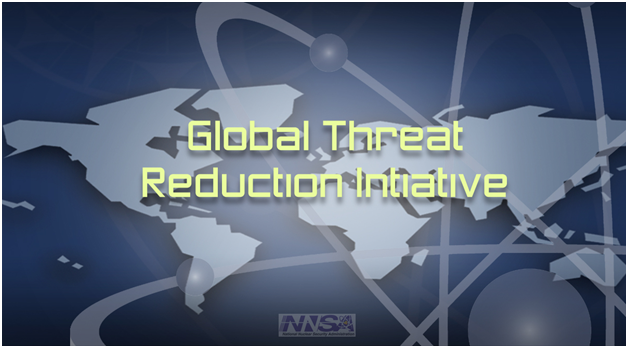The Global Threat Reduction Initiative (GTRI) is a program of the National Nuclear Security Administration under the U.S. Department of Energy (DoE). Its mission is to "reduce and protect vulnerable nuclear and radiological material located at civilian sites worldwide." The GTRI have been very successful to date. There are three programs that are being carried out by the GTRI.
The GTRI Convert program is dedicated to converting about two hundred research reactors and isotope production facilities around the globe from the use of highly enriched uranium (HEU) for fuel and targets to low enriched uranium for fuel and targets. This will help reduce nuclear threats because weapon-grade HEU will no longer be needed in these reactors and production facilities.
The GTRI Nuclear and Radiological Materials Removal Program removes and/or disposes of weapons grade uranium and other radiological materials. The removal and conversion of nuclear materials from Russian warheads, U.S. warheads, and other civilian sources of radiological materials is an ongoing part of this program. This will help reduce nuclear threats because weapon-grade nuclear materials will no longer be available to terrorists.
The GTRI Nuclear and Radiological Materials Protection program is intended to protect at-risk nuclear and radiological materials worldwide from threats of theft and sabotage until these materials can be secured by a more permanent security program. This reduces the nuclear threat by making these material more difficult, if not impossible, to obtain.
The U.S. DoE has releases a budget proposal for 2015 which would push the target date for the reactor conversion project from 2030 to 2035. The budget for the GTRI programs would be cut by about eighteen percent. At the same time, the Obama Administration is asking for an increase in funding for nuclear weapons research and production by seven percent. The U.S. DoE is also delaying the implementation of security measures for non-military sites in the U.S. that possess nuclear and/or radiological materials. The original completion date for this project was 2044 but the U.S. DoE has changed that to TBD.
Senator Dianne Feinstein (D-Calif.) attacked the plans to underfund and delay the GTRI programs while speaking at a Senate Appropriations Energy and Water Development Subcommittee hearing recently. She said, "This simply is unacceptable at the same time we're pouring money into the modernization of certain warheads. It's just unacceptable." She was especially concerned about the slowdown in providing protection for the nuclear and radiological materials at non-military sites that would be a tempting target for terrorists bent on building a "dirty bomb." She asked, "Are terrorists no longer interested in acquiring nuclear or radiological bombs for improvised nuclear devices and dirty bombs? I don't understand how you can defend this budget on nonproliferation cuts."
The U.S. Energy Secretary, Ernst Moniz defended the program cuts saying that they were unavoidable with the very tight budget situation forcing "tough choices." He also defended the Obama Administration's record of international nuclear threat reduction.
